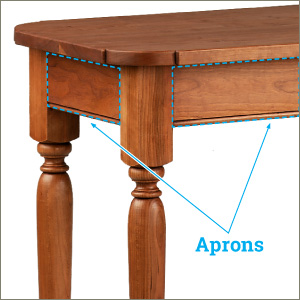See This Report on Highland Manor Wood Products, Llc
Table of ContentsSome Of Highland Manor Wood Products, LlcThe Highland Manor Wood Products, Llc DiariesThe smart Trick of Highland Manor Wood Products, Llc That Nobody is Talking AboutThe Greatest Guide To Highland Manor Wood Products, Llc5 Simple Techniques For Highland Manor Wood Products, Llc
Clean the busted edges of the table leg to ensure a smooth, solid bond. Establish your work area in a well-lit, clean area to stay clear of any further damage. Carefully align the broken pieces. Precision is your good friend here. Use secures to hold the pieces with each other briefly. When the glue is dry, sand the area for a smooth finish.Removing the legs alleviates the pressure they may sustain if the table is brought or filled poorly, preventing them from birthing too much weight or experiencing unnecessary stress. Make certain that the table, especially its legs, is firmly positioned in the relocating automobile. The table shouldn't wobble or have the potential to drop over.

Excitement About Highland Manor Wood Products, Llc
Take the covering up tape and wrap your drill bit about inches of the way down the little bit. This is to assist see to it you don't pierce with the table top while guaranteeing the depth you require for the screws. Very carefully drill each of the screw openings to the proper depth, using the marks you made.
Use the impact motorist to screw each leg securely into location. It's finest to go one leg at once to make sure the placement is ideal and each leg is protected before going on to the following. Turn your new table back over and enjoy it in your home! We understand you'll like your new hairpin table in your space.
(https://soundcloud.com/highlandwo0d)
Repeat these steps to take care of any type of other busted legs on the table.
Utilize a jig attended reduce them diagonally from corner to collar to create four corner blocks. Cut a notch out of the rear of the edge block opposite from the diagonal cut so that the notch fits over the top of the leg and supplies extra toughness in the edge.
Highland Manor Wood Products, Llc Fundamentals Explained
Drive one more screw, focused through the block, into the corner of the table leg. kitchen island legs. Step the size and size under the table between the legs.

Lots of tables have integrated stretchers to include stability. 2 stretchers run between the sides of the legs on the table's short ends, with one lengthy stretcher connecting the two short cots in the.

Highland Manor Wood Products, Llc Fundamentals Explained
Each item has its very own story to tell, and antique table legs play an essential function in the overall visual appeals and stability of these treasures. Recovering them not only restores their appeal but likewise helps protect their historical significance. Recognizing antique table legs begins with identifying the different sorts of antique tables and their historical contexts.
Antique tables come in numerous designs, such as Queen Anne, Chippendale, or Victorian, each with its unique style and features. Recognizing the kind of table you have will direct your restoration initiatives.
For example, French bnisterie furnishings, with its complex craftsmanship, would likely be most worth restoring and could necessitate specialist solutions, whereas a table found at a yard sales may not warrant the remediation price. As you start the journey of recovering antique table legs, one of the preliminary and crucial actions is to very closely take a look at these integral elements of your treasured item.
Little Known Questions About Highland Manor Wood Products, Llc.
Begin by inspecting the surface of the table legs thoroughly. Search for any type of visible cracks that might have established with time. Fractures can vary in size and extent, from small surface area flaws to deep architectural cracks. Each fracture narrates of the table's history, and resolving them is necessary for both visual appeals and structural security (wooden bench legs).
These splits can jeopardize the general strength and appearance of the legs. Identifying their presence and level is essential before waging remediation. Butt joints are more vulnerable to splitting because they offer a limited surface for adhesive bonding, making them prone to separation under anxiety or pressure. Pay close attention to the joints where the table legs fulfill the table's structure or apron.
Assess the overall architectural integrity of the legs. Look for any type of bending or twisting that may influence their security. Examine the joints carefully to evaluate the level of looseness. Some joints may just need adhesive and clamping, while others may require extra reinforcement. By thoroughly analyzing the wear and damage, you can create a detailed remediation strategy customized to the particular requirements of your antique table legs.